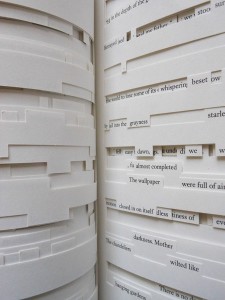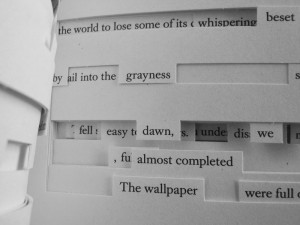Searching for a Jewish past is the topic of Jonathan Safran Foer’s Tree of Codes. His best-selling, Hollywood-adapted debut novel Everything is Illuminated (2002) already depicted a young man on a trip to the Ukraine in search of his family’s past.  His new book is also a search for Jewish roots, though this time artistic, rather than biographical.
His new book is also a search for Jewish roots, though this time artistic, rather than biographical.
Experimenting with the concept of absence, the book reproduces parts of Bruno Schulz’s Street of Crocodiles, the English translation of one of two surviving texts of a writer, whose other works were lost when the National Socialists seized his Polish hometown Drohobycz in 1941 and murdered its citizens, including Schulz, in 1942. As if to depict the loss of literature by destroying the letters in a book, Foer cut into Schulz’s pages, leaving only select words and half sentences behind, thereby reducing, already in its title, Street of Crocodiles to Tree of Codes. Missing elements of literature was, already in 1969, a self-imposed constraint in the writing of Holocaust survivor Georges Perec, who wrote a novel entirely without the letter “e,” appropriately named La disparition (The Disappearance). And absence is one of the most important concepts in visual art after 1945, and in Jewish art in particular.  In Berlin, the memorial to the 1936 book-burning on Bebelplatz by Michal Ullman is an underground skeleton of a library, with shelves emptied of their books. In our own museum, absence is expressed in Daniel Libeskind’s “Voids,” empty spaces which cut through the building and interrupt our visitors to remind them of the cultural heritage lost, discarded, and destroyed.
In Berlin, the memorial to the 1936 book-burning on Bebelplatz by Michal Ullman is an underground skeleton of a library, with shelves emptied of their books. In our own museum, absence is expressed in Daniel Libeskind’s “Voids,” empty spaces which cut through the building and interrupt our visitors to remind them of the cultural heritage lost, discarded, and destroyed.
Tree of Codes traces the Jewish art of loss, by choice of title, to the biblical Tree of Life “lost” by Adam and Eve, whereby leaves have turned into pages, and reality into literature. Placing his work in this tradition, Foer (via Schulz) writes: “we find ourselves part of the tree of cod es. Reality is a s thin as paper.” (92) (Jonathan Safran Foer, Tree of Codes, London: Visual Editions 2010.)
Naomi Lubrich, Media